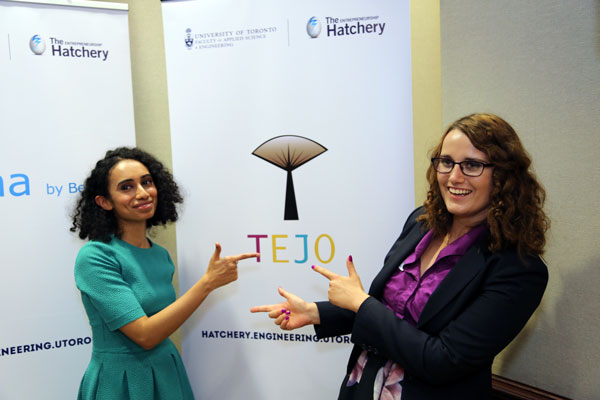September 13, 2017 – Startups founded by engineering students are poised to address challenges from sustainability to surgery. Twelve companies pitched their vision to a room of judges, investors and faculty members at the fifth annual Hatchery Demo Day, held September 6 at U of T Engineering.
“Five years after we founded the Hatchery, the spirit of entrepreneurship continues to be the engine of all that we do,” said Joseph Orozco, executive director of The Entrepreneurship Hatchery, in his opening remarks. “We nurture the mindset for entrepreneurial thinking, and we have seeded the ideas that I believe will transform our society. Together, we are building the Canada of tomorrow.”
Demo Day is the culmination of The Hatchery Nest program, a four-month accelerator which pairs student teams with experienced mentors — including executives, lawyers, medical professionals and engineers — to develop their businesses. They receive detailed feedback on their business plans, explore their proposed market, learn about patents and marketing and build prototypes using 3D printers and other fabrication resources. A second Hatchery program, Hatchery Launch Lab, focuses on supporting startups built on graduate-level research in the Faculty.
Of the dozen teams that presented at Demo Day 2017, four took home a share of $42,500 in seed funding, including one $20,000 grand prize and two $10,000 runner-up prizes donated by alumnus Anthony Lacavera (CompE 9T7), founder and chairman of Globalive Holdings and former CEO of WIND Mobile. An additional $2,500 Orozco prize is provided through funds raised by the students themselves.
MIE student Rachel Baker (IndE 1T7 +PEY) won a runner-up prize for her company, Tejo.
$10,000 Lacavera Prize: Tejo — A better way to buy makeup

The North American makeup industry is worth more than $10 billion, but it does a poor job of serving people with darker skin tones. Not only is darker makeup more expensive, but many traditional retailers don’t even carry the brands that provide these shades. Furthermore, buying online can be a gamble, as it’s difficult to choose the right colour without trying the product.
“You’re supposed to pick from swatches, but different screens render colours differently,” said Rachel Baker (IndE 1T7 +PEY), co-founder of Tejo. “What looks great on your smartphone might not look great in real life.”
Baker and her business partner, fashion management student Lakshmy Subramanian, believe that artificial intelligence and machine learning offer a way forward. Tejo users simply take a selfie, which is then fed into software designed by the pair. Using open-source computer vision and a proprietary algorithm that accounts for ambient lighting conditions, Tejo determines a user’s precise skin tone and recommends an appropriate brand. If the user chooses to buy, Tejo collects a 5 to 10 per cent commission on the sale.
“Before we joined The Hatchery, we were really struggling to get people who don’t wear makeup to understand what our business is,” said Baker. “They provided us with excellent mentors and advisors, and really helped us to get a really clear vision of what we want our company to be.”
The pair plan to use the prize money to file a patent on their software and expand their e-commerce platform, which is already accepting early sign-ups online. Once they have penetrated their target market, they plan to expand their “recommendation engine” approach to other areas, including ethically sourced beauty products and men’s grooming.